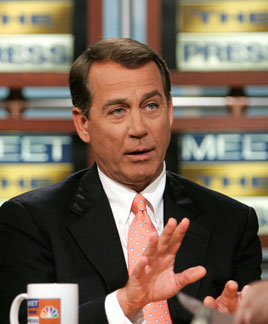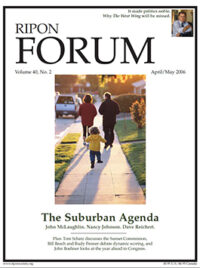
From the moment I was elected to serve my fellow House Republicans as Majority Leader, I’ve been asked the same question innumerable times by innumerable people: “What do you think about [insert issue of the day here]?”
The question is simple enough. What do I think about increasing access to health insurance for American workers? Strengthening border security? Lobbying reform? I’m for them all, and House Republicans are taking aim at each. But beneath the veneer of these simple questions is, I believe, a fundamental misunderstanding of the role a Majority Leader is supposed to play.
The answer to those questions shouldn’t be what I personally think, but what the Members of the House Republican Conference think. As I see it, the Majority Leader isn’t here to issue commands from the top down based on personal preference. The role of a Majority Leader is to facilitate, to guide, and to build consensus from the ground-up.
Remember: the Majority Leader and the rest of the elected Leadership are important. But the lifeblood of the House runs through the Committees and their Members.
Already in the last few weeks I’ve had the opportunity to do just that.
The House Republican vision for the year is taking shape from the ground-up. We’ve already identified a set of themes we’ll drive in the coming months. We’re pledging to keep America prosperous, ensure affordable and accessible health care, spend tax dollars wisely, and strengthen national security and border security.
Our united vision will be critical as a lodestar to guiding our legislative efforts, ensuring Republican unity, and ensuring our constituents clearly understand why we’re here and what we’re all about. It is my job as Majority Leader to ensure whatever policy we put forth reflects that vision. I will do so the same way I have approached crafting the vision — from the ground up.
Remember: the Majority Leader and the rest of the elected Leadership are important. But the lifeblood of the House runs through the Committees and their Members. I will work to facilitate planning for success without interfering with the Committees’ prerogatives to set policy, and to make sure that any bill that will subject Members to political risk will have sufficient political and communications support.
How will I do that? First, I will work to take our collective vision and implement it across Committee jurisdictional lines. These lines are necessary for the efficient working of the House, but they can also present obstacles to developing and advancing our very best ideas. And many important themes cross jurisdictional lines. We must identify key substantive themes based on our vision, and then ensure that the appropriate Committees work together to develop agendas to drive those themes.
Second, I will work with the Committees and their Members to lay the groundwork for successful outreach. Battles are ultimately won with superior preparation — planning, strategy, identifying weaknesses early and solving them before they become exposed. We are most successful advancing both policy and political goals when we integrate policy making with strategy.
Big goals take communications and outreach strategies as well as policy strategies, and each is stronger when informed by the others. This is why an aggressive communications effort isn’t just about communicating with the press; it’s communicating with Members. It’s ensuring every Member knows where we’re going and how we’ll get there and ensuring everyone is part of the decision making process. Again: success begins at the ground level.
In addition, any communications effort must help prepare Members to win the debate as well as the vote. After all, if our goals are serious, we have to take them seriously. When we stop caring urgently about winning the debate as well as the vote, we lose confidence in our accomplishments, and even victories seem a little hollow. We shouldn’t be satisfied with winning just because we have more votes; we want to win because we’re right on the merits as well.
I’m hopeful the lessons I’ve learned over the last 15 years will serve our Conference well. When I served as Chairman of the Education and the Workforce Committee, we worked from the ground up on every major piece of legislation we moved. We developed principles that guided us through the entire process; asked the tough questions about policy, message, and where our support would be; and we sought bipartisan support without sacrificing Republican principles. When we asked Members to take tough votes, we provided them with press and coalitions support in their districts. Our victories were the products of the same extensive planning, Member outreach, press and coalitions support I will bring to the entire Conference.
In the end, I see a tremendous opportunity for House Republicans to recapture the energy, spirit, and creativity of the early years of our majority. During my tenure, the success of our ideas, our principles, and our Members will come first. As a result, the final answer to the “What do you think…” questions won’t simply be my personal preference — it will come from a united House Republican Conference.
John Boehner represents the 8th District of Ohio in the House of Representatives and is the House Majority Leader.




